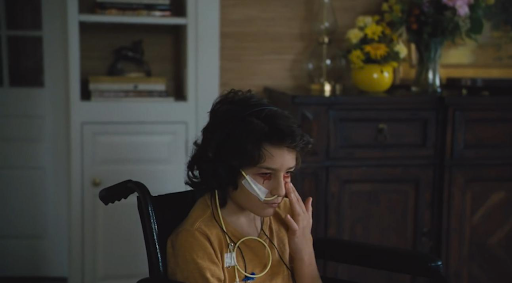In the lore of Greek myth, King Agamemnon was preparing to sail off and conquer Troy when he unwittingly killed one of Artemis’ sacred deer. Artemis, furious at this transgression, stops the wind from blowing and prevents Agamenon and his fleet from sailing to Troy. The only thing he can do to atone for his mistake is to sacrifice his daughter, Iphigenia. Some versions of the myth end with Iphigenia being sacrificed to Artemis, while some end with Artemis providing a deer to replace Iphigenia at the moment of sacrifice, reminiscent of the story of Abraham on Mount Moriah.
Yet, from perspectives other than Martin’s, this idea of justice is completely imbalanced. Steven is a skilled surgeon who rarely makes mistakes, but he still can’t be expected to save the life of every patient put in front of him. Even if it would be right to find blame in Steven, other people are being punished for his mistake. His wife, Anna, even directly confronts Martin about this, telling him, “I don't understand why I should have to pay the price. Why my children should have to pay the price.” Punitive justice is never perfectly balanced, because no two actions have the same consequences. The context surrounding each crime, culprit, and victim will always be unique and can never be replicated. Even Martin realizes that perfect balance can’t be achieved, responding to Anna, “I don't know if what is happening is fair, but it's the only thing I can think of that's close to justice.”
Along with the dry and unemotional acting, characters also frequently say or do things that would be considered extremely socially inappropriate or awkward, with other characters not even batting an eye. Both Anna and Kim (the Murphy’s daughter) discuss Kim’s menstruation in polite conversation with guests, Steven publicly tells Anna that he does not value her medical opinion in this case, the list goes on. This combination of stoic acting and lack of social norms features in all of Lanthimos’ films, and seems to be done at least in part as a way to explore the idea of what makes us human. There are many moments where it feels as if the characters on screen are aliens or machines rather than human beings. They aren’t totally lacking human emotions like love and anger, but they don’t seem affected by them the same way that normal people are either. With this in mind, exploring very human topics like justice and fatherhood is an interesting choice by Lanthimos. Perhaps he sees punitive justice as a rational, but inhuman solution. We often like to think of the legal system as blind and objective, abstracting from human emotion, but maybe this isn’t always for the best. An eye for an eye is rational, but we would be better off seeking restorative justice than seeking to make the whole world blind. Similarly, it could be that Lanthimos is rejecting the idea of rationality being all that is needed for fatherhood, as true fatherly love is irrational. Whether or not this is his goal, his direction is always interesting, even if its motivation is ambiguous.
Not everyone will love this slow psychological horror, with Lanthimos’ style being too off putting for some, but it’s still worth checking out for arthouse film fans looking for a unique movie. The Killing of a Sacred Deer is streaming now on Netflix in the United States.






 RSS Feed
RSS Feed
